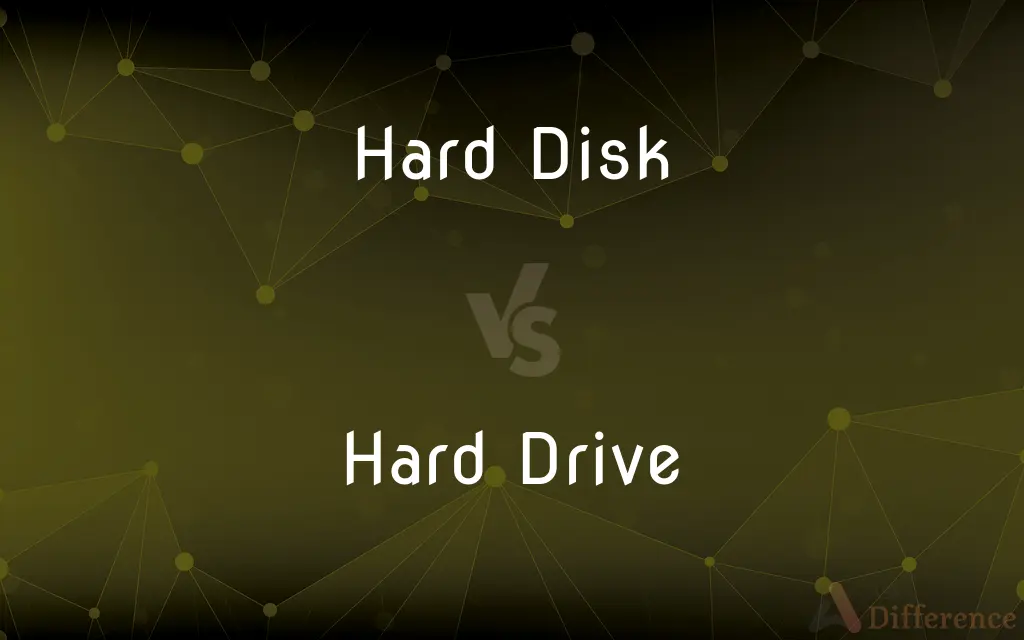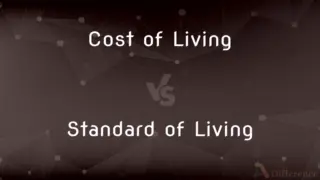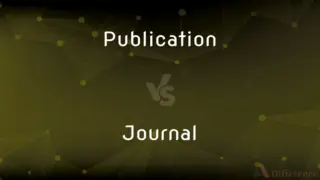Hard Disk vs. Hard Drive — What's the Difference?
Edited by Tayyaba Rehman — By Fiza Rafique — Published on October 21, 2023
A hard disk refers to the data storage platter inside a device, while a hard drive is the entire device, containing the hard disk, motor, and other components.

Difference Between Hard Disk and Hard Drive
Table of Contents
ADVERTISEMENT
Key Differences
A hard disk is essentially the physical disk inside the storage device where data is written. It is a spinning platter made from metal or glass, coated with magnetic material. As the disk spins, a read/write head floats above it, either reading data from or writing data to the disk. Without the hard disk, there would be no medium on which the data could be stored.
The term hard drive, on the other hand, encompasses more than just the hard disk. A hard drive is the complete data storage device, including not just the hard disk, but also the motor that spins the disk, the read/write head, and the electronic components that control these operations. The hard drive is what you'd think of as the entire unit or module, often encased in metal or plastic, which is then installed in a computer.
In casual conversation, the terms hard disk and hard drive are often used interchangeably. It's common for someone to say "hard drive" when referring to the internal storage of their computer, even if they're technically speaking about the hard disk within the drive. However, for professionals in the tech industry or in scenarios where specifics matter, understanding the distinction is important.
Comparison Chart
Main Component
Storage platter
Entire storage device
Function
Medium where data is written/read
Device that reads/writes data
ADVERTISEMENT
Composition
Metal or glass with magnetic coating
Contains hard disk, motor, read/write head, etc.
Physical Appearance
Metallic, round disk
Encased module or unit
Usage in Context
Often refers specifically to storage medium
More general; can mean entire device or its storage
Compare with Definitions
Hard Disk
The primary data storage area in computers and many electronic devices.
The hard disk's capacity determines how much data a device can hold.
Hard Drive
The main storage component in PCs and laptops.
The technician recommended a solid-state hard drive for faster speeds.
Hard Disk
A spinning platter coated with magnetic material for data storage.
The hard disk within the device can store up to 1TB of data.
Hard Drive
The complete assembly of hard disk, motor, and electronic components for data storage.
I upgraded my computer with a faster hard drive for better performance.
Hard Disk
A magnetic disk on which digital data is stored.
The computer's performance can depend on the speed of its hard disk.
Hard Drive
The primary storage device in a computer that contains the hard disk.
The hard drive in my computer crashed, so I had to replace it.
Hard Disk
The physical component inside a hard drive responsible for data storage.
The technician replaced the damaged hard disk with a new one.
Hard Drive
An electronic device that stores and retrieves digital data using a hard disk.
Modern hard drives can store several terabytes of information.
Hard Disk
The medium within a storage device where data is read or written.
The laptop's hard disk failed, causing loss of data.
Hard Drive
A unit that reads from and writes to the hard disk within it.
The computer's hard drive is almost full, necessitating data cleanup.
Common Curiosities
Is the hard disk the same as the hard drive?
No, the hard disk is the storage medium inside the hard drive.
What causes a hard disk to fail?
Physical damage, prolonged use, manufacturing defects, or malware can lead to failure.
How do I know if my hard drive or hard disk is failing?
Slow performance, clicking sounds, or frequent errors can be signs.
Can I replace the hard disk within my hard drive?
Typically, for traditional hard drives, the disk is integral. However, the entire hard drive can be replaced.
How can I increase the storage of my hard drive?
You can either replace it with a larger capacity drive or add an additional external hard drive.
Do external hard drives have hard disks inside?
Traditional external hard drives do; however, SSD-based ones do not.
What's the lifespan of a hard drive?
It varies, but typically 3-5 years for regular use.
Why is my hard drive making noise?
It could be the normal sound of the disk spinning or a sign of potential failure.
Do solid-state drives (SSDs) have hard disks?
No, SSDs use flash memory and don't have spinning hard disks.
Can data from a failed hard disk be recovered?
Often, yes, through specialized data recovery services.
How does a hard disk store data?
It uses magnetic fields to store data on its surface.
Is it better to have a larger hard disk or a faster hard drive?
It depends on needs; larger for storage and faster for performance.
What's the difference between internal and external hard drives?
Internal drives are installed inside a device, while external ones connect via ports.
How is data read from a hard drive?
A read/write head floats above the spinning hard disk and reads the magnetic data.
How do I care for my hard drive to ensure longevity?
Avoid physical shocks, keep it cool, and periodically check for errors.
Share Your Discovery

Previous Comparison
Cost of Living vs. Standard of Living
Next Comparison
Publication vs. JournalAuthor Spotlight
Written by
Fiza RafiqueFiza Rafique is a skilled content writer at AskDifference.com, where she meticulously refines and enhances written pieces. Drawing from her vast editorial expertise, Fiza ensures clarity, accuracy, and precision in every article. Passionate about language, she continually seeks to elevate the quality of content for readers worldwide.
Edited by
Tayyaba RehmanTayyaba Rehman is a distinguished writer, currently serving as a primary contributor to askdifference.com. As a researcher in semantics and etymology, Tayyaba's passion for the complexity of languages and their distinctions has found a perfect home on the platform. Tayyaba delves into the intricacies of language, distinguishing between commonly confused words and phrases, thereby providing clarity for readers worldwide.










































